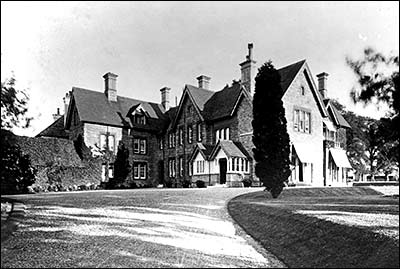It is with deep sorrow that we record the death of Mr. Edward Campbell Browning, M.A., J.P., Barrister-at-Law, of Rushden House, which sad event took place with painful suddenness on Monday afternoon. Sincere regret was felt throughout the town on Monday evening, when the sorrowful news became known, regret which was all the deeper because Mr. Browning’s demise follows so soon upon that of his gallant son, Major James
 |
|
Rushden House
|
Alexander Browning, of the Queen’s Bays, who lost his life in the service of his King and country.
Born in 1836, the late Mr. E. C. Browning was in the 79th year of his age. On Sunday morning last he attended the service at St. Mary’s Church, Rushden, and he appeared to be in his usual state of health. After lunch on Monday he took a walk as was his custom, and at that time there were no signs that the end was so near, his health apparently being perfectly normal. On his return to his residence, however, he complained of feeling unwell, and in a very brief period – at about 4.15 p.m. – he passed away, quietly, in his sleep. Dr. Kesteven, locum tenens for Dr. Greenfield, who had been summoned, could only pronounce life to be extinct. Dr. Owen and Dr. Denys Crew were also called, but Mr. Browning was beyond medical aid. Failure of the heart’s action was the cause of death.
The deceased gentleman leaves a widow, one son (Mr. Robert Campbell Browning, of Whittlebury, Towcester) and four daughters – Mrs. F. Joseph Simpson, of Higham, Mrs. Terry Short, of Lincoln, Miss Mary Browning, and Miss Rosa Browning. The greatest sympathy is felt in the town of Rushden and throughout the district for the sorrowing family, who have suffered so many heavy bereavements of late – the death of Mr. E. C. Browning, the loss of Major J. A. Browning in action, the death of Mrs. Browning’s nephew (Commander Pratt-Barlow, who went down in the disaster to H.M.S. Hawke), and the death of Mr. Browning’s nephew, Captain Charles Browning, late of Clapham Park, Bedford, who fell a victim of the war.
Mr. E. C. Browning was the second son of the late Mr. Henry Browning, of 73, Grosvenor-street, London, who was the founder of the celebrated firm of Twiss and Browning. Educated at Bury St. Edmunds and at Christ Church, Oxford, Mr. Browning took his degree of M.A. at that University. He was called to the Bar in 1862, and practised as a Barrister for 14 years, and subsequently went into the City; he was a keen, extensive, and successful investor, his judgment being sound and his experience wide.
In the year 1873 he married Alice Louisa, daughter of Mr. James Pratt-Barlow, of Hyde Park Gate, London, W.
The late Mr. Browning was for some years a partner in the firm of Twiss and Browning, wine and spirit merchants, which was founded in the year 1814 by his father. In 1897 Mr. Browning retired from the firm and came to reside at Knuston Hall, Irchester, from 70, Onslow Gardens, London. After residing at Knuston Hall for about five years he purchased Rushden House, which he considerably enlarged and beautified. In the year 1905 Mr. Browning was placed upon the Commission of the Peace for the County of Northampton, and he took his seat upon the Wellingborough Bench.
At one time Mr. Browning did a great deal of shooting, and he was an excellent shot. He was interested in cricket and was a vice-president of the Rushden Town Cricket Club. He displayed a keen interest in the welfare of the Boy Scout movement, and the Rushden Scouts received many proofs of his thoughtfulness and goodwill. The deceased gentleman was a regular attendant at St. Mary’s Church, Rushden. He was a member of the Union Club, London.
The deceased was brother of Captain Hugh Browning, who for some years was Master of the Oakley Hounds.
Another brother was Colonel Montague Charles Browning, C.B., a distinguished veteran of the Crimea and the Indian Mutiny, and who, for 30 years, was a member of the firm of Twiss and Browning, from which he retired in 1903. Colonel Browning was formerly Lieutenant Colonel and afterwards Hon. Colonel of the 3rd (Militia) Battalion Suffolk Regiment. He served in the Crimea and was present at the siege and fall of Sebastopol, and during the Indian Mutiny was staff officer of a field force at the attack on the Tarmgha Hills and at the capture of Mondetti, where his horse was shot under him. He was mentioned in dispatches in 1858. He received his Commandership of the Bath on his retirement from the Militia in 1897, and he died, in his 69th year, at his country residence, Brantham Court, Manningtree, Essex, on Dec. 9th, 1905.
The death of Major J. A. Browning was naturally a severe blow to his father, who, however, bore the bereavement with marked fortitude. Mr. Browning usually spent the season at Hove, where he was well-known, and it was while at Hove that the sad message was received of the death of the Major.
The funeral of the late Mr. Browning will take place to-morrow (Thursday) at 2.45 p.m. at St. Mary’s Church, Rushden.
|